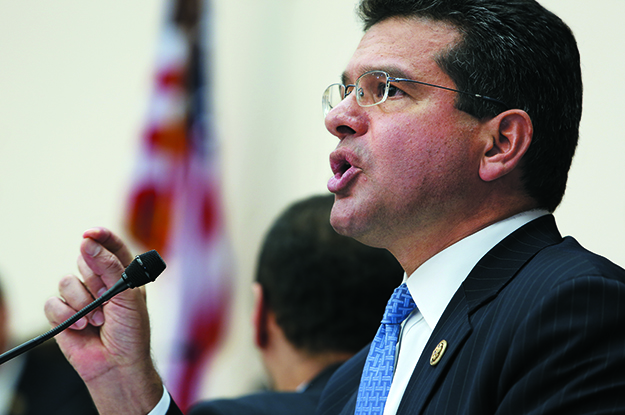The United States consists of 50 states, the District of Columbia, and five U.S. territories — one of which is Puerto Rico. Individuals born in Puerto Rico are U.S. citizens, but island residents cannot vote for president or senators. The territory has a single delegate in the U.S. House of Representatives who can vote in committee, but not on the House floor. I have held this position since 2009.
In addition to lacking meaningful democratic rights, Puerto Rico is deprived of equal treatment. The U.S. Constitution, as interpreted by a series of decisions rendered by the Supreme Court over time, authorizes Congress to treat territories inequitably compared to states in regards to federal spending and tax credit programs. As a result, Puerto Rico is deprived of billions of dollars it would receive if it were a state.
To compensate for the lack of fair treatment, the government of Puerto Rico has borrowed heavily — although not always wisely — in order to provide a decent quality of life for its people. Eighteen public entities in Puerto Rico issue bonds, including the central government and government-owned instrumentalities like the electric power authority, the water and sewer authority, and the highway and transportation authority. These entities have now amassed over $70 billion of debt, which is roughly the size of Puerto Rico’s gross state (territory) product. The governor of Puerto Rico recently asserted that this debt was not payable in its entirety, generating headlines in the media.
Puerto Rico, once virtually ignored, has now become the center of attention.
Some commentators seem to believe that Puerto Rico’s economic challenges are of recent vintage, but that is not the case. For many decades, primarily as a result of unequal treatment, there has been a large gap between economic performance in the territory and in the states. In recent years, that gap has become a chasm.
The consequences have been as predictable as they are painful. My constituents are exercising their rights as U.S. citizens and relocating — not emigrating — to the states at a rate of 50,000 a year. Once they arrive on the mainland, they are entitled to full voting rights and full equality under federal laws — rights they were denied back in the territory. In 2000, Puerto Rico was home to about 3.8 million people. Soon, the island’s population will fall below 3.5 million. This is the largest sustained outmigration in modern American history, and it is only getting worse.
Puerto Rico’s territorial status is not only the root cause of Puerto Rico’s economic and demographic crisis; it is also the main obstacle preventing Puerto Rico from managing and, ultimately, overcoming this crisis.
Consider Chapter 9 of the federal bankruptcy code. Under this provision, Congress empowers each state government to authorize an insolvent “municipality” — defined as a political subdivision, public agency, or instrumentality of the state — to restructure its debts in an orderly fashion under the supervision of a federal bankruptcy judge, in accordance with federal law. A state government may authorize — or decline to authorize — its insolvent municipalities to file for Chapter 9 protection. The power to decide rests with the state government.
There have been about 50 municipal bankruptcy filings since 2010, although some have been dismissed by the presiding judge for a variety of reasons. Most prominently, several years ago, Michigan authorized Detroit to seek Chapter 9 protection, and the city has emerged far stronger than before.
Unfortunately, while Puerto Rico is treated like a state under the chapters of the bankruptcy code involving individuals and corporations, it is not treated like a state under the chapter pertaining to municipalities. Congress did grant Puerto Rico the power to authorize its municipalities to adjust debts between 1938 and 1984, but in 1984 — for reasons unknown — Congress excluded Puerto Rico from Chapter 9.
Such is the life of a territory: always subject to the good (or ill) will of a Congress in which it has a limited voice and no vote.
I have introduced a bill in the U.S. House to rectify this unprincipled exclusion, and 14 U.S. senators have cosponsored an identical bill in the U.S. Senate. The legislation would simply grant Puerto Rico a power that it had for nearly half a century and that every state has — namely, the power to authorize its insolvent municipalities to seek Chapter 9 protection. Under the bill, Puerto Rico could seek to restructure the debts of its insolvent public corporations, but not of the island’s central government.
Chapter 9 can be a useful tool even if it is not used. The mere prospect of a Chapter 9 filing by a municipality can foster consensual negotiations between the municipality and its creditors.
Ultimately, to prosper, Puerto Rico will need to be treated equally in all respects, and that requires U.S. statehood. In the interim, Congress can help Puerto Rico help itself by providing the territory with state-like treatment under Chapter 9.
—
Congressman Pedro R. Pierluisi is Puerto Rico’s nonvoting delegate in the U.S. House of Representatives and a candidate for governor of Puerto Rico.





